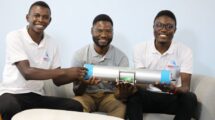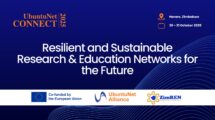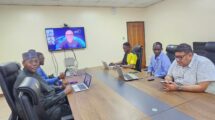Words: Nicky Wako, Advocacy & Donor Engagement Manager, GÉANT
To unlock the potential of research and education (R&E) through increased access for African education and research institutions to digital infrastructures and technologies, AfricaConnect3 (AC3) Project attended the eLearning Africa Conference 2022, held in Kigali, Rwanda on 11-13 May 2022.

The AC3 Team, comprised of GÉANT and UbuntuNet Alliance, introduced the invaluable contribution of the African National Research and Education Networks (NRENs) to a global audience of multilevel stakeholders seeking to tackle the continent’s problems, create more jobs, contribute to finding cures, climate change solutions and provide the youth with skills and capacities for the 21st century and beyond by strengthening the educational sectors and learning methods.
In line with the eLearning Africa conference theme, the AC3 team contributed to discussions addressing the digital challenges of infrastructure development, access to quality R&E, adaptability of EdTech and emphasising the importance of including infrastructure for R&E institutions in the dialogues. The team met various experts, stakeholders, and partners at the booth.

Prof. Madara Ogot, CEO of UbuntuNet Alliance, joined a panel of experts discussing ‘Inspiring Content for Universities’. Nicky Wako, AC3 Advocacy and Donor Engagement Manager, chaired a session titled ‘Coding & Empowerment – The Future of Africa‘ joined by Hendrina Doroba from the African Development Bank and Lady Mariéme Jamme, Founder of IamtheCODE, UK, who shared their approach to solving unemployability through coding.
What is AC3 beyond connectivity?
Simply put, a survival mechanism for the 4.5 million users through 1700 higher R&E institutions across the continent of Africa, which has less than 3% of global researchers or fewer than 350 researchers per million persons and a such a vital partner in national development and a sound economic investment.
The agility of AC3 NRENs have been providing higher education and research institutions with the tools to switch to online education – especially during the COVID-19 pandemic -through a vast service offering that included online video-conferencing tools, e-learning management platforms, discounted data bundles, and secure university Wi-Fi outside of campuses. Through their offering, NRENs keep ensuring that African students do not fall behind and the African R&E community continues to contribute to the global quest for the betterment of humanity.
Edtech is here to stay, bringing with it the digital divide
During the eLearning Africa Conference, the number of EdTech Companies providing a myriad of e-learning solutions to close the access to educational inequality was inspiring. From mobile connectivity units to learning management systems that allowed users to select their learning courses in various languages, the aim remained to provide a solution to educate and leave no one behind. However, it was noted that the hyper-focus on connecting the unconnected and rapid digitalisation efforts will impact the R&E sector and contribute to the growing digital inequality and divide. Without a concentrated multisectoral, multistakeholder attempt to mitigate the pitfalls, we collectively create an unintended dynamic where citizens will be left behind, regardless of age. Accessibility, affordability, adaptability, and connectivity must be at the centre of the dialogue as frequent as the multitude of e-learning solutions available.
The unprecedented COVID-19 lockdowns highlighted the multisectoral and multilevel unpreparedness of various national agencies, including the R&E institutions. The immediate lockdown also pointed out the swift increase of the digital divide between the haves and the have nots that will continue to impact access to quality education, research engagements and collaborations.
The way forward
AC3 partners, UbuntuNet Alliance, WACREN and ASREN, with over a decade of experience in providing the required connectivity, supporting policymakers and growing the number of end-users, are instrumental to unlocking the digitalisation of Africa R&E sectors whilst seeking solutions to provide end-users with tools to level the playing field and leave no students, researchers or institutions behind. An example is the Research and Education Network of Uganda (RENU) which is extending connectivity to its users beyond campus through its metro eduroam initiative.
Africa does not lack talent. However, its full extent of possibilities will remain unexplored if students, researchers, institutions, and those who are bold enough to change the fortunes continue to lack access to the systems and opportunities to engage in cross border collaborations for the best of the people and planet with other bold visionaries.





